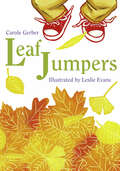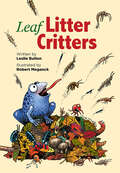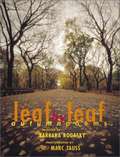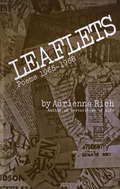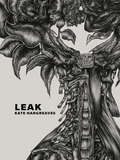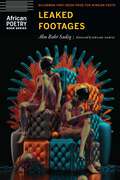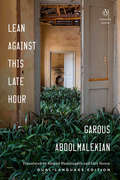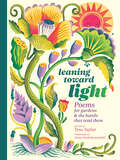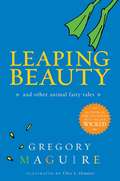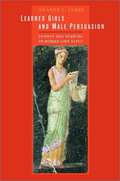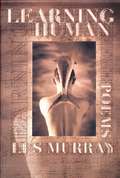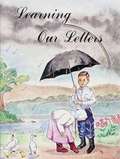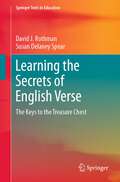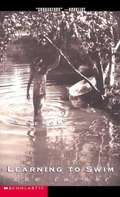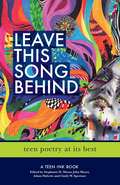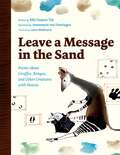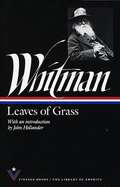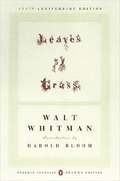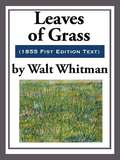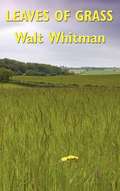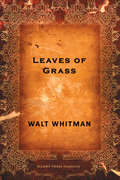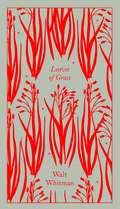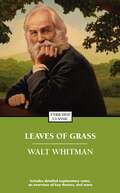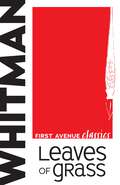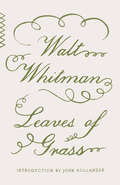- Table View
- List View
Leaf Jumpers
by Carole GerberThis vibrant poem celebrates the beauty of autumn while inviting us all to go ahead and jump in that big, colorful, pile of fall leaves. Leslie Evan&’s bold artwork brings together gold, orange, yellow, red, and brown leaves into a literary pile creating the magic of autumn for young readers. The poetic text gives simple facts about different types of fall leaves making it easy for readers to identify leaves ranging from red maple to sycamore by color, shape, and other characteristics. Informative and fun, Carole Gerber brings us a wonderful introduction to seasons and science for the earliest of leaf jumpers.
Leaf Litter Critters
by Leslie BulionTake a poetic tour through the duff and get the dirt on the tiny, fascinating critters that live there.For all the kids who can't resist turning over a rock, science poetry maven Leslie Bulion presents nineteen lively ecological poems in a variety of verse forms about the "brown food web" and the creatures that live there—from bacteria and rove beetles to mushrooms and millipedes, and all of the other busy recyclers in between. Illustrator Robert Meganck adds to the fun with humorous and vivid, yet scientifically detailed, artwork. Science notes run throughout for added context, and thorough back matter includes a glossary, poetry notes, hands-on investigations, and other resources for cross-curricular learning.
Leaf by Leaf: Autumn Poems
by Barbara RogaskyAS SUMMER TURNS TO autumn, a crisp chill fills the air, and suddenly the landscape is awash in color. This collection of poetry chronicles the splendor of our most brilliant season -- leaf by leaf -- from the golden days of September to the glittering first frosts of early winter. Here, the voices of twenty-five master poets, including William Butler Yeats, Walt Whitman, Mary Oliver, Robert Browning, and Edgar Allan Poe, resonate with the sense of wonder that fall stirs in all of us. Barbara Rogasky's eloquent selections are brought to life by Marc Tauss's lyrical photography, which captures the nuances of the poetry in a series of spectacular images. The result is a spellbinding journey that will delight the senses and bring comfort to the soul.
Leaflets: Poems 1965-1968
by Adrienne RichLeaflets is Adrienne Rich's fifth book of poems. It contains twenty-eight new poems, five adaptations of Dutch, Yiddish, and Russian poets, and a sequence of seventeen poems loosely based on the ghazal, a common form in Middle Eastern poetic tradition; these ghazals comprise a kind of notebook of a month in the summer of 1968. The themes of this book are the poetics of violence and the poetics of love. Its impulse is the deepening of recognitions through language, in a time of ignorance and mutilation. Miss Rich has written: "For a poet...there is this primary labor with words. But I have the notion that how you live your life has something to do with it--that morality, for a poet, is a refusal of blinders, of traditional consolations, a courage to be alone, or wounded....A willingness to step out into the fog, to take paths which may lead nowhere. Certainty, predictability, are the first supports that have to go. I see the poetry of things as standing in resistance to brute mechanistic force, the charge of the rhinoceros with its head down. To discover--literally--this poetry and re-create it in language is a poet's essential action."
Leak
by Kate HargreavesWelcome to Kate Hargreaves' Leak, where the relationship between language and the body lives in the bumps and bruises that in turn become new ways of understanding the borders and leaks of our everyday existence. In Leak, bodies lose pieces and fall apart, while words slip out of place and letters drop away. Emergency room signage becomes incomprehensible, the census requests bodily measurements, a cyclist confuses oil with her own blood. This visceral deconstruction of the body and its multiple representations tests the boundaries of body politics — pathologically, emotionally, and lyrically.
Leaked Footages (African Poetry Book)
by Abu Bakr SadiqWinner of the Sillerman First Book Prize for African Poets The poems in Leaked Footages carry urgent subjects, ranging from death to disappearance to grief to memory. Not only do the poems fulfill the tradition of witnessing often manifested in contemporary poets such as Garous Abdolmalekian and Ilya Kaminsky, but they extend that tradition by the medium through which they witness: the technical and the technological. Here, the camera, the closed-circuit TV, cinematographic techniques, and the cyborg are trusted for truth telling. Reality is represented in footage seen through the eyes of multifaceted speakers. In Abu Bakr Sadiq&’s exploration of northern Nigeria in speculative poetry, the lyrical meets the chronicle. In this fusion of Afrofuturism with experimental poetic techniques, the reader witnesses a country ravaged by terrorism and the consequences of war, as well as the effects of these on those who survive. While the tone is grave with concern and conscience, the poems do not take the easy route of sentiment. Instead, attention is paid to structure—from the erasure poems that are informed by the theme of disappearance to the contrapuntal poems that are influenced by the testaments of leaving.
Lean Against This Late Hour (Penguin Poets)
by Garous AbdolmalekianA vivid, affecting portrait of life in the shadow of violence and loss, for readers of both English and PersianThe first selection of poems by renowned Iranian poet Garous Abdolmalekian to appear in English, this collection is a mesmerizing, disorienting descent into the trauma of loss and its aftermath. In spare lines, Abdolmalekian conjures surreal, cinematic images that pan wide as deftly as they narrow into intimate focus. Time is a thread come unspooled: pain arrives before the wound, and the dead wait for sunrise. Abdolmalekian resists definitive separations between cause and effect, life and death, or heaven and hell, and challenges our sense of what is fixed and what is unsettled and permeable. Though the speakers in these poems are witnesses to the deforming effects of grief and memory, they remain alive to curiosity, to the pleasure of companionship, and to other ways of being and seeing. Lean Against This Late Hour illuminates the images we conjure in the face of abandonment and ruin, and finds them by turns frightening, bewildering, ethereal, and defiant. "This time," a disembodied voice commands, "send us a prophet who only listens."
Leaning toward Light: Poems for Gardens & the Hands That Tend Them
by Edited by Tess TaylorThis beautiful poetry anthology offers a warm, inviting selection of poems from a wide range of voices that speak to the collective urge to grow, tend, and heal—an evocative celebration of our connection to the green world. Caring for plants (much like reading a good poem) brings comfort, solace, and joy to many—offering an outlet in difficult times to slow down and steward growth. In Leaning toward Light, acclaimed poet and avid gardener Tess Taylor brings together a diverse range of contemporary voices to offer poems that celebrate that joyful connection to the natural world. Several of the most well-known contemporary writers, as well as some of poetry&’s exciting rising stars, contribute to this collection including Ross Gay, Jericho Brown, Mark Doty, Jane Hirshfield, Ada Limón, Danusha Laméris, Naomi Shihab Nye, Garret Hongo, Ellen Bass, and James Crews. Select poems are paired with reflective pauses and personal recipes from the authors, and colorful illustrations are featured throughout. Plus, the gorgeous hardcover package with ribbon bookmark makes this anthology a distinctive gift. Gardening offers a rich and expansive subject, with poems moving thematically through the year from planting and weeding to harvesting and eating. Poets find purpose in browsing a seed catalog and comfort in picking green tomatoes despite California&’s wildfire season raging on—reminding us how gardening is a healing practice, both for ourselves and the spaces we tend. The range of experience reflected, from caring for a few houseplants to an expansive garden or farm, offers wide appeal and illuminating insights for gardeners, plant lovers, or anyone interested in connecting more deeply with the earth. This publication conforms to the EPUB Accessibility specification at WCAG 2.0 Level AA.
Leaping Beauty: And Other Animal Fairy Tales
by Gregory MaguireOnce upon a time . . . nothing was as it seemed.What if Sleeping Beauty were actually a frog princess, cursed forever to weep, sleep . . . and leap? Or the Three Chickens had to outwit Goldifox? What if Cinder-Elephant had the chance to attend the ball of her dreams—can she bake her way to meeting a dashing prince?Zany animals of all species get their own fairy tale endings in these laugh-out-loud twists on the classics from Gregory Maguire, bestselling author of Wicked.
Learned Girls and Male Persuasion: Gender and Reading in Roman Love Elegy
by Sharon L. JamesThis book does a bold and utterly original thing by reading the Roman love poets from the point of view of the women the poets speak to or about.
Learning Human
by Les MurrayA bighearted selection from the inimitable Australian poet's diverse ten-book body of work Les Murray is one of the great poets of the English language, past, present, and future. Learning Human contains the poems he considers his best: 137 poems written since 1965, presented here in roughly chronological order, and including a dozen poems published for the first time in this book. Murray has distinguished between what he calls the "Narrowspeak" of ordinary affairs, of money and social position, of interest and calculation, and the "Wholespeak" of life in its fullness, of real religion, and of poetry. Poetry, he proposes, is the most human of activities, partaking of reason, the dream, and the dance all at once -- "the whole simultaneous gamut of reasoning, envisioning, feeling, and vibrating we go through when we are really taken up with some matter, and out of which we may act on it. We are not just thinking about whatever it may be, but savouring it and experiencing it and wrestling with it in the ghostly sympathy of our muscles. We are alive at full stretch towards it." He explains: "Poetry models the fullness of life, and also gives its objects presence. Like prayer, it pulls all the motions of our life and being into a concentrated true attentiveness to which God might speak." The poems gathered here give us a poet who is altogether alive and at full stretch toward experience. Learning Human, an ideal introduction to Les Murray's poetry, suggests the variety, the intensity, and the generosity of this great poet's work so far.
Learning Our Letters
by Rosene L. BurkholderFrom the book: A a A is for a little ark; ‘Twas baby Moses’ boat. His mother gently tucked him in, And Miriam watched it float.
Learning the Secrets of English Verse: The Keys to the Treasure Chest (Springer Texts in Education)
by David J. Rothman Susan Delaney SpearThis textbook teaches the writing of poetry by examining all the major verse forms and repeating stanza forms in English. It provides students with the tools to compose successful lines of poetry and focuses on meter (including free verse), rhythm, rhyme, and the many other tools a poet needs to create both music and meaningfulness in an artful poem. Presenting copious examples from strong poets of the past and present along with many recent student examples, all of which are scanned, each chapter offers lessons in poetic history and the practice of writing verse, along with giving students a structured opportunity to experiment writing in all the forms discussed. In Part 1, Rothman and Spear begin at the beginning, with Anglo-Saxon Strong Stress Alliterative Meter and examine every major meter in English, up to and including the free verse forms of modern and contemporary poetry. Part 2 presents a close examination of stanza forms that moves from the simple to the complex, beginning with couplets and ending with the 14-line Eugene Onegin stanza. The goal of the book is to give students the essential skills to understand how any line of poetry in English may have been composed, the better to enjoy them and then also write their own: the keys to the treasure chest. Rothman and Spear present a rigorous curriculum that teaches the craft of poetry through a systematic examination and practice of the major English meters and verse forms. Under their guidance, students hone their craft while studying the rich traditions and innovations of poets writing in English. Suitable for high school students and beyond. I studied with Rothman in graduate school and went through this course with additional scholarly material. This book will help students develop a keen ear for the music of the English language.—Teow Lim Goh, author of Islanders
Learning to Swim
by Ann TurnerRelated through a series of poems narrated by the author, Learning to Swim tells the true story of the summer when she was 6 and was sexually abused by an older neighbor boy.
Leave This Song Behind: Teen Poetry at Its Best
by John Meyer Adam Halwitz Stephanie MeyerIt's been 10 years since the last book in the Teen Ink series Written in the Dirt was published. Now, a whole new batch of teen writers has emerged with their own unique voices. Leave This Song Behind features the best poetry submitted by those writers to Teen Ink over the last five years. The pieces in this book were chosen because they were so powerful that they stood out from the rest. Teen Ink editors took a deep look into each poem's strengths then divided Leave This Song Behind into seven sections based on the poetic techniques or qualities that moved them most. Vivid sensory details made some poems shine; others caught their attention with simple, sparse language. Still others were chosen because of their thoughtful use of form; compelling stories; strong figurative language; unexpected connections and wit; and fresh writing about familiar topics. Dig in and let these brave young voices capture your heart and mind with their passion, their pain, and their amazing poetry!
Leave a Message in the Sand: Poems about Giraffes, Bongos, and Other Creatures with Hooves
by Bibi Dumon TakWhat would a boar text to a pig, a camel post on a dating site, or a goat shout from the mountaintops? In this unforgettable poetry collection, even-toed ungulates take the spotlight. Ever asked a giraffe about the clouds, read an okapi&’s letter to the editor, or debated which gnu would win the race across the Serengeti? Playful poems and whimsical illustrations feature hoofed creatures from all around the world, from Siberian musk deer to African dik-diks to South American vicuñas. Weaving together humor, scientific detail, and a poignant concern for conservation, Leave a Message in the Sand introduces readers to wild creatures with even wilder things to say.
Leaves Of Grass, A Textual Variorum Of The Printed Poems, 1855-1856
by Walt WhitmanIn 1855, the first edition of Leaves of Grass appeared, consisting of twelve untitled poems and a preface outlining the author's poetics. An initial commercial failure, this volume was the first stage of a massive, lifelong enterprise. Six editions and some thirty-seven years later, Leaves of Grass would become one of the central works m the history of world poetry. This Vintage Books/The Library of America edition includes both the 1855 first edition in its exact, original form and the magnificent final edition of 1891-1892.
Leaves of Grass
by Walt Whitman Harold BloomI celebrate myself, and sing myself, And what I assume you shall assume, For every atom belonging to me as good belongs to you. When Walt Whitman self-published his Leaves of Grass in July 1855, he altered the course of literary history. One of the greatest masterpieces of American literature, it redefined the rules of poetry while describing the soul of the American character. Throughout his great career, Whitman continuously revised, expanded, and republished Leaves of Grass, but as Harold Bloom reminds us, the book that matters most is the 1855 original. In celebration of the poem's 150th anniversary, Penguin Classics proudly presents the 1855 text in its original and complete form, with a specially commissioned introductory essay by Harold Bloom.
Leaves of Grass
by Walt WhitmanFrom one of America's best loved and most important poets comes a masterpiece. Leaves of Grass is considered by many to be the greatest collection of poetry ever produced by an American. And this, the 1855 First Edition Text, is considered the strongest and most important of the many editions produced throughout Whitman's life. Here Whitman is at the height of his writing prowess, and no other edition would match it for strength and impact. "The most extraordinary piece of wit and wisdom that America has yet contributed." - Ralph Waldo Emerson
Leaves of Grass
by Walt WhitmanFrom one of America's best loved and most important poets comes a masterpiece. Leaves of Grass is considered by many to be the greatest collection of poetry ever produced by an American. And this, the 1855 First Edition Text, is considered the strongest and most important of the many editions produced throughout Whitman's life. Here Whitman is at the height of his writing prowess, and no other edition would match it for strength and impact. "The most extraordinary piece of wit and wisdom that America has yet contributed." - Ralph Waldo Emerson
Leaves of Grass
by Walt WhitmanOriginally published as a collection of twelve poems in 1855, Leaves of Grass eventually grew to more than four hundred poems, as Walt Whitman continued to edit and add to the collection throughout his life.Celebrating life, humanity, and the material world, Leaves of Grass was considered obscene at the time of its publication because of its overt discussion of sensual pleasure. It is now considered to be among the greatest collections of poetry to be published in modern times.Be it mystery, romance, drama, comedy, politics, or history, great literature stands the test of time. ClassicJoe proudly brings literary classics to today's digital readers, connecting those who love to read with authors whose work continues to get people talking. Look for other fiction and non-fiction classics from ClassicJoe.
Leaves of Grass (Penguin Clothbound Poetry)
by Walt WhitmanA collectible new Penguin Classics series: stunning, clothbound editions of ten favourite poets, which present each poet's most famous book of verse as it was originally published. Published by the acclaimed Coralie Bickford-Smith and beautifully set, these slim, A format volumes are the ultimate gift for poetry lovers. In 1855 Walt Whitman published his first collection of poetry, Leaves of Grass. The volume received great praise from leading Transcendentalist poet Ralph Waldo Emerson. This encouraged what would become a lifelong project as Whitman expanded and rewrote the volume until his death in 1892. Whitman's innovative use of free verse and the quotidian achieved his aim of reaching out to the everyday American. This edition, based on the earliest published version of 1855, features Whitman's most famous poem 'Song of Myself', an American epic inspired by his personal experiences.
Leaves of Grass: 1st Edition 1855 (Enriched Classics)
by Walt Whitman Cynthia Brantley Johnson Charles BrowerENDURING LITERATURE ILLUMINATED BY PRACTICAL SCHOLARSHIP <P> A collection of quintessentially American poems, the seminal work of one of the most influential writers of the nineteenth century. <P> THIS ENRICHED CLASSIC EDITION INCLUDES:<P> * A concise introduction that gives readers important background information<P> * A chronology of the author's life and work<P> * A timeline of significant events that provides the book's historical context<P> * An outline of key themes and plot points to help readers form their own interpretations<P> * Detailed explanatory notes<P> * Critical analysis, including contemporary and modern perspectives on the work<P> * Discussion questions to promote lively classroom and book group interaction<P> * A list of recommended related books and films to broaden the reader's experience<P> Enriched Classics offer readers affordable editions of great works of literature enhanced by helpful notes and insightful commentary. The scholarship provided in Enriched Classics enables readers to appreciate, understand, and enjoy the world s finest books to their full potential.
Leaves of Grass: 1st Edition 1855 (First Avenue Classics ™)
by Walt WhitmanIn Leaves of Grass, American poet Walt Whitman assembled most of his poetic works. Included in this collection are some of Whitman's most famous poems, including "Song of Myself," "I Sing the Body Electric," "Out of the Cradle Endlessly Rocking," and "O Captain! My Captain!" The first edition of Leaves of Grass was published in 1855 and contained only twelve poems. Whitman kept revising his collection throughout his life; the final edition contains more than three hundred poems. This is an unabridged version of the poems from the final edition of Whitman's celebrated collection, published shortly before his death in 1892.
Leaves of Grass: Including A Fac-simile Autobiography, Variorum Readings Of The Poems And A Department Of Gathered Leaves... - Primary Source Edition (Vintage Classics #Vol. No. 9)
by Walt WhitmanAbraham Lincoln read it with approval, but Emily Dickinson described its bold language and themes as "disgraceful." Ralph Waldo Emerson found it "the most extraordinary piece of wit and wisdom that America has yet produced." Published at the author's expense on July 4, 1855, Leaves of Grass inaugurated a new voice and style into American letters and gave expression to an optimistic, bombastic vision that took the nation as its subject. Unlike many other editions of Leaves of Grass, which reproduce various short, early versions, this Modern Library Paperback Classics "Death-bed" edition presents everything Whitman wrote in its final form, and includes newly commissioned notes.
